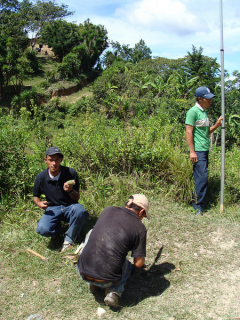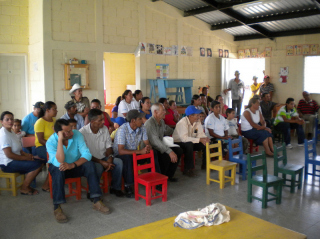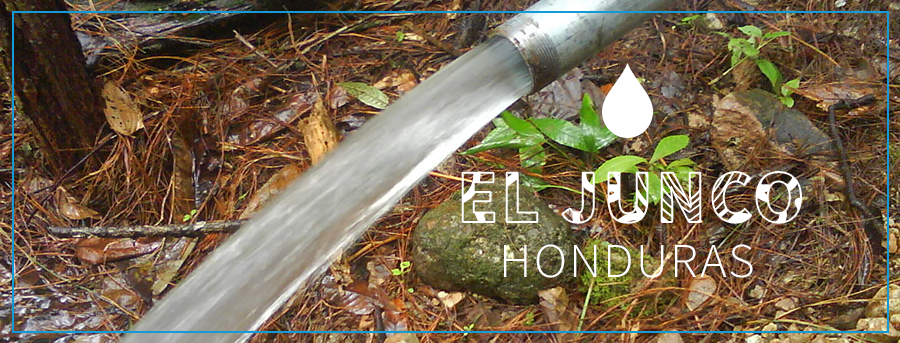
About El Junco
El Junco is a small community with a population of 154 people in the
municipality of San Juan de Flores. Prior to Global Brigades' arrival,
community members in El Junco suffered from a lack of proper water,
hygiene and sanitation infrastructure, healthcare, and education.
Common colds, respiratory infections, and parasites, and diarrhea were
common. Few homes had concrete floors, properly functioning latrines,
proper water storage, or efficient stoves with chimneys, which further
exacerbated their health problems. Luckily, there is a health center in the
community, which is staffed by a nurse. School is offered until 9th grade in
the community of El Junco and nearly 90% of the population can read and
write. Most families work in agriculture and they grow coffee, corn, beans,
and plantains. These crops are genearlly used for subsistence, although
some are sold for an average monthly income of roughly 1,500 Lempiras
($75.00).
El Junco's Water Challenge
Prior to Global Brigades' arrival, the community of El Junco was relying
on a drinking water supply system that did not meet all of the adequate
conditions of a correctly working system in terms of water quality and
quantity. The previous water system was constructed 25 years ago by a
Honduran government institution called Project ALA 86/20. No
monitoring or follow up was provided by this institution after
construction. The original system was constructed to supply a total of
50 households distributed to the two communities of El Junco and El
Encinal without taking into account the growthof these communities. Presently, these communities have a total of approximately 80 inhabited households, about 10 uinhabited households, two schools, two kindergartens, and one health center relying on the water system. Houses, which were not originally connected to the system were forced to get water by carrying it from a nearby stream. Pipe diameters in the original system design were not sufficient to provide water consistently to all the houses that were connected. El Junco was located downstream of El Encinal on the water system. Due to imporper rationing, valve manipulation, and water use in El Encinal, El Junco was often left without water. In many cases, houses could go without receiving water for up to a week.
The Water Council had only two members who were not complying with any of their responsibilties. Due to the lack of organization in the Water Council and poor water service, the vast majority of community members were not paying a water fee. This lack of organization and general infrastructural failure caused the community to stop treating its water. Illnesses related to water and poor sanitation and hygiene were common. As a very under resourced community, El Junco did not have the funds to improve their existing system, or to consider constructing a new system. The community had previously solicited support from government organizations without receiving any help. Water Brigades came to an agreement with the community of El Junco and El Encinal to assist in the reconstruction of their potable water system.
| Project Overview | |
| Beneficiaries | 154 |
| Volunteers | 182 |
| System Type |
Gravity |
| Project Cost |
$14,000 |
| Pipes Installed |
2,500 m. |
| Hours of Education |
25 |
| Storage Tank Volume |
5,000 gallons |
| Additional Information |
| General Community Profile |
| Water Methodology |
| Pre-Brigade Lesson Plans |
| Water Project Final Report |
| Follow-up Report 09/11/2013 |
The Water Solution for El Junco
Water Brigaders from 16 different universities worked in El
Junco from May 2010 to August 2010. During that time, these
volunteers worked with community members to:
• Build a simple dam with water intake structure
• Construct 5,000 gallon storage tank with chlorinator
• Dig approximately 2,500 meters of trench and lay pipeline
• Connect 33 houses, 1 schools, and 1 health center
• Provide educational seminars to children in the community on water
and health related topics
 When Water Brigades first entered the community of El Junco a dire water need was observed. Furthermore, it lacked strong leadership,organization, and motivation due to having lived so many years without a proper water system and no government support. There was a clear divide between the people and leaders of El Encinal and El Junco when it came to the issue of the water system. Building two separate systems and giving each community power over its own system and thus proved to was a great success. In addition, Water Brigades was able to see the change in community organization and buy-in to their water system throughout the project.
When Water Brigades first entered the community of El Junco a dire water need was observed. Furthermore, it lacked strong leadership,organization, and motivation due to having lived so many years without a proper water system and no government support. There was a clear divide between the people and leaders of El Encinal and El Junco when it came to the issue of the water system. Building two separate systems and giving each community power over its own system and thus proved to was a great success. In addition, Water Brigades was able to see the change in community organization and buy-in to their water system throughout the project.
| Water Brigades Chapters that Worked in El Junco |
||
| Water Brigades Chapter | Month | Volunteers |
| Stonybrook College | May 2010 | 10 |
| Emory University | May 2010 | 17 |
| University of British Columbia | May 2010 | 10 |
| Boston University | May 2010 | 7 |
| University of Texas - Austin | May 2010 | 10 |
| UC Berkeley | May 2010 | 11 |
| Chapman University | June 2010 | 11 |
| University of Chicago | June 2010 | 11 |
| Arizona State University | June 2010 | 23 |
| Ohio State University | June 2010 | 12 |
| UC Santa Cruz | June 2010 | 14 |
| DePaul University | July 2010 | 13 |
| Duke University | August 2010 | 7 |
| Pacific Union College | August 2010 | 5 |
| Marquette University | August 2010 | 7 |
| New York University | August 2010 | 7 |
Current Status
Last Visit: September 11, 2013
A tropical storm causing flooding and massive landslides hit the mountain of Joyas del Carballo in October 2011. The storm caused the stream that is the El Junco water source to grow exponentially, washing boulders, trees, and other debris downstream in its current and greatly damaging the El Junco water system. The original dam built by Global Brigades was entirely covered by the land movements and was unusable, and the majority of the conduction line was either washed away or damaged beyond use.
In May 2012, FORCUENCAS, an institution funded by the European Union, donated the money to El Junco to replace the dam as well as the damaged piping. Fortunately, the central storage tank is located in an area of the community that was not as severely affected by the storm and did not suffer any damage. It is still fully functioning and is well protected by a fence that was installed by the Water Council when the project was originally finished.
Visit Other Programs in El Junco
Global Brigades strives to implement a model of Holistic Development in communities through a system of collectively implementing health, economic, and education initiatives to strategically meet a community's development goals. Learn more about the other programs being implemented in El Junco:
![]() Medical
Medical![]() Dental
Dental![]() Engineering
Engineering ![]() Microfinance
Microfinance![]() Public Health
Public Health ![]() Business
Business![]() Architecture
Architecture![]() CHW
CHW
